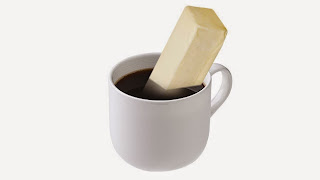Have you heard anything about people adding butter to their
morning coffee and that is their breakfast?
What’s the story??? It’s one of the newest food trends and
most people know it as Bulletproof Coffee, a term coined by Dave Asprey.
It all began when Dave came in from -10 degree weather in
Tibet and was rejuvenated with a cup of yak butter tea. After years of research
he formulated his recipe for Bulletproof coffee, which is now touted by musicians,
athletes and top executives.
Here’s how it works, you brew 16 oz. of organic coffee, add
2 tablespoons unsalted butter, 1-2 tablespoons MCT (medium-chain triglyceride) oil or coconut oil, and
blend to combine.
The nutrition facts:
Calories: 441
Fat: 51 g (80% saturated)
He emphasizes the use of high quality, organic coffee with
lower mtotoxins, grassfed butter with highly desirable fat soluble vitamins and
MCT oil to promote high energy, fat loss and brain function.
I interviewed an avid Bulletproof Coffee drinker for a little
more first hand insight and here is what they had to say.
How did you first hear about Bulletproof Coffee?
It was mentioned on a podcast that I listen to.
What made you want to try it?
I was looking for a new, quick breakfast option and I was
drinking coffee every morning anyway. I had also just been hearing more about
the benefits of adding more healthy fats to your diet.
How long have you been on the Bulletproof Coffee bandwagon?
About 6 months
Do you have it every morning?
Every weekday morning
How do you prepare your Bulletproof coffee?
I add 2 cups brewed coffee to a blender and then add 2 Tbsp
MCT oil, 2 TBSP ghee, a dash of creatine, and a dash cinnamon and blend for
about 10 seconds. I then pour it into a large Tervis and take it to go.How do you feel after consuming it and for the next several hours?
Honestly, I feel pretty good. I notice it the most if I take like a week off from it (if I’m out of town) and then come back and get back to the routine of having the bulletproof coffee. I feel more alert and a little sharper.
When is the next time you eat something after drinking your Bulletproof coffee in the morning?
For me, 2 hours later I will have a snack. This is because I exercise regularly and need more substance.
Do you plan to continue drinking Bulletproof coffee for the foreseeable future?
Yes, I will continue to have it even if I find that I have
time to make breakfast in the morning because I enjoy the benefits I am
experiencing as well as the taste.
What advice would you give someone wanting to give it a
shot? Any tips/tricks?
The actual recipe calls for organic grassfed butter.
However, I am lactose intolerant so I use ghee. Also, start off with small
doses of the butter or ghee and mct oil as it may upset your stomach at first
if you start off with larger doses. Finally, if you want to try it and have any
expectation of health benefits such as weight loss you will have to reevaluate
your entire diet.
I also calculated the nutrition information for the specific
blend of ingredients that my interviewee uses:
Calories: 470
Fat: 58 g (46 g saturated)
Source One Nutrition’s bullet points on Bullet Proof Coffee:
- As with any food trend, proceed with caution.
- I am a proponent of healthy fats, so the fat content alone does not scare me. Fats will not make you fat.
- If you are only having buttered coffee for breakfast, be sure to consume VERY nutrient dense meals and snacks the rest of the day, as the nutrient content of the coffee concoction is very low.
- Know your lab numbers before and after drastically changing your diet to know how it is affecting YOU.
I personally have never tried this coffee concoction, but I
may do so after the birth of my son and will certainly let you know what I
think.
Have you tried butter in your coffee?



